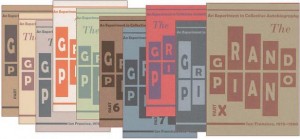
Luke Harley, “Poetry as Virtual Community: A Review of The Grand Piano: An Experiment in Collective Autobiography,” Jacket2, 7 February 2013. Click here.
In part due to its demanding format—ten volumes by ten authors, published over a five-year period (2006–10), totaling over 1600 pages—and in part due to the difficult questions of poetics and community it raises, The Grand Piano has only now, more than two years after the last volume saw the light, received the kind of engaged and comprehensive review that will help open its project to readers in all its multiple dimensions. Barry Schwabsky’s 2011 review in The Nation, uploaded to this site, was likewise welcome as an enthusiastic introduction to a broader readership, one that perhaps had not heard of Language writing and would like to know more. Harley’s review, on the other hand, assumes not only familiarity but positional engagement with the movement, these authors, this writing. Working through the debates of the 70s and 80s, as we did in The Grand Piano, Harley’s discussion extends literary history into the concerns of the present; it becomes, as Foucault would have said, a work of effective history. In so doing, his review joins Eleana Kim’s 2001 online history of Language writing to offer a broad overview of the movement, contributing to the work of documenting the past history and present possibility of language-centered poetics. Going beyond mere narrative history, critical readings like Harley’s reinterpret the effort to document the movement as a reenactment of its polemical force—from the archival matter of readings, talks, magazines, and books to its real-time engagement. Given the depth of discussion Harley and predecessors have initiated, one can only hope they will encourage more. La lutte continue!
... More











